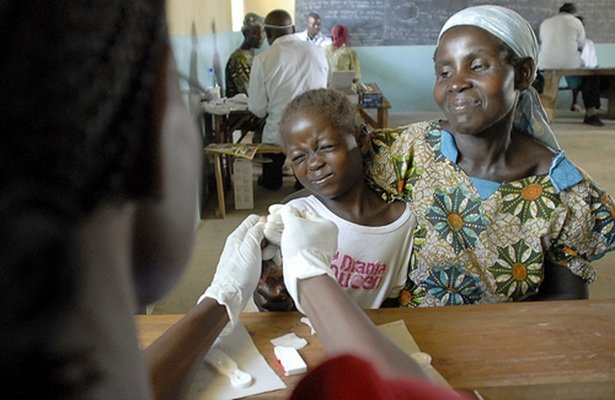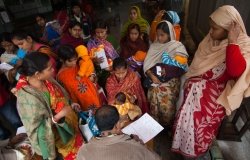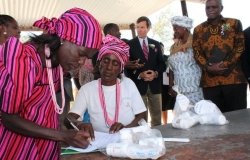
A blog of the Wilson Center
Malaria Elimination Proof of Concept?

Cabo Verde hasn’t had a case of malaria in three years. It once had the deadly disease on all ten of its islands.
We live in a time when there is a lot of tough news related to our struggle against poverty and poverty-enhanced disease. By some estimates, nearly 7 million people have died from COVID-19, and the virus’s economic costs have been catastrophic for families, communities, and countries the world over.
However, there is renewed hope for progress in tackling one of the world’s greatest killers: malaria. Caused by more than 100 types of parasites, malaria enters the body through the bite of the female Anopheles mosquito and contaminates the bloodstream. While the US successfully eliminated the disease as a public health threat in 1951, half the world remains at risk of infection according to Malaria No More, a global organization that mobilizes political commitments and funding for malaria eradication.
This January, Cabo Verde joined the ranks of 43 nations and one territory certified as malaria-free by the World Health Organization (WHO)—a remarkable achievement highlighted by Secretary of State Antony Blinken during his recent trip to the country’s capital of Praia. Cabo Verde’s malaria-free status is especially important in a country where tourism accounts for nearly a quarter of its GDP.
Thanks to the US President’s Malaria Initiative, the Global Fund to Fight AIDS, Tuberculosis, and Malaria, and dedicated health leadership in participating countries over the last two decades, the world has made substantial progress in reducing the disease’s spread and associated deaths. However, the COVID-19 pandemic saw momentum against the disease reduced (and in some places even reversed) for a variety of reasons.
Cabo Verde’s success story serves as a reminder of what can be achieved if global health leaders refocus their efforts on eradicating malaria once again. Taking on the malaria scourge requires a multi-pronged approach: carefully investigating, diagnosing, and counting malaria cases; providing ill individuals with free, effective, and early treatment; and preventing new cases by administering medicines, controlling mosquito breeding areas, and providing insecticide-treated mosquito nets.
To be sure, Cabo Verde’s path to eliminating malaria had its difficult moments. In 2017, the country reported 184 cases, marking its worst outbreak in more than 20 years. But Cabo Verde made the right investments. When it achieved independence less than 50 years ago, it had only 13 doctors. Today, 80% of its citizens live within 30 minutes of a healthcare facility.
So why is any of this newsworthy and important? Despite great strides, malaria continues to claim approximately 600,000 lives each year—and 95% of these deaths occur in Africa. The 2023 World malaria report found that just four countries make up nearly half of the world’s malaria cases: Nigeria, the Democratic Republic of the Congo, Uganda, and Mozambique. And even more tragically, the WHO reports that 80% of malaria deaths in the region are children under the age of five.
Even for those who survive their bout with the disease, malaria has severe long-term costs and consequences. Sick children are unable to attend school and fall behind on their lessons. In fact, malaria keeps kids out of school more than any other disease. Sick adults are unable to work, straining family incomes and limiting national economic growth. While Malaria No More estimates that $12 billion is lost as a direct result of malaria infections, the true cost of lost growth potential is immeasurable.
Measures to prevent malaria’s spread have saved many millions of lives, and new vaccine developments offer renewed hope for a malaria-free future. Cameroon is currently rolling out the world’s first malaria vaccine—RTS,S, or Mosquirix—following successful trials in Ghana, Kenya, and Malawi. As of November 2023, more than 2 million children had received a vaccination, leading to a 13% decrease in early childhood deaths across the three countries. Another 17 nations are waiting in the wings for their own vaccine rollout. And a second vaccine to help keep up with demand, R21/Matrix-M, is undergoing clinical trials.
Cabo Verde may soon have company with its malaria-free status. Sao Tome and Principe, as well as the Comoros, reported no malaria deaths for the first time in 2022. Botswana, Eritrea, and Eswatini have each reported less than 10 malaria deaths. And while it is difficult to know the true impact of malaria treatments and preventative measures, the WHO calculates that 2.1 billion cases of malaria were averted globally between 2000 to 2022.
It’s true that Cabo Verde is a small archipelago—and São Tomé and Principe, along with the Comoros, are also small nations. Their makeup and geography offer advantages in taking on diseases like malaria. Importantly, they also offer proof of concept. They show that with focus, leadership, tools, and discipline, we can defeat diseases that have stolen lives as far back as we can measure—and they offer hope.
This blog was researched and drafted with the assistance of Katherine Schauer.
About the Author











